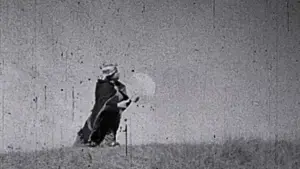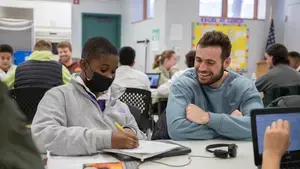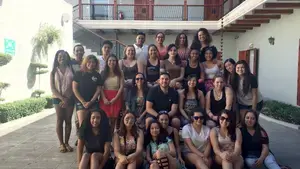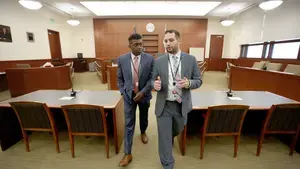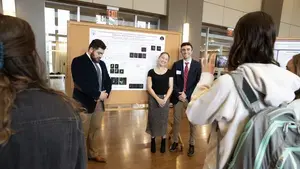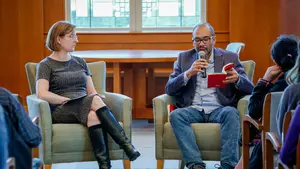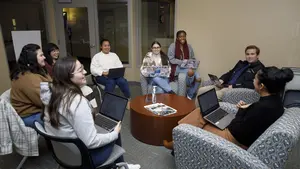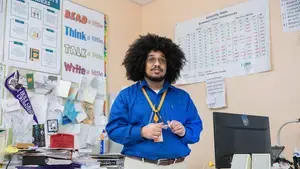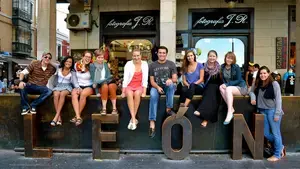Spanish
Areas of Study
The Spanish department has one of the largest and widely specialized faculty members among liberal arts colleges in the country, with expertise in Caribbean, Latin American, Latinx, Peninsular and pre-Hispanic literature, film, drama, cultural studies and women's writing, as well as creative writing, linguistics, medical humanities, critical race and decolonial studies, among other areas.
Our faculty design courses that engage students in discussions about contemporary research and contribute to various programs across the college, including Latin American, Latinx, and Caribbean Studies, the College Honors Program, Montserrat, Passport, Gender, Sexuality, and Women's Studies, as well as Environmental Studies.
- Focused Language (including creative writing, medical Spanish, translation and Spanish for business, among others)
- Culture and Cinema
- Linguistics (e.g. bilingualism in the Spanish-speaking world, second language acquisition)
- Textual Analysis
- Readings in Literature
- Advanced Pre-modern Studies
- Advanced Modern Studies
Requirements
Spanish majors must complete a minimum of 10 courses and a maximum of 14.
Majors must take one course from each of the eight areas below:
- Area 1 - Composition and Conversation
- Area 2 - Focused Language
- Area 3 - Culture and Cinema
- Area 4 - Linguistics
- Area 5 - Introduction to Textual Analysis (prerequisite for Readings courses)
- Area 6 - Readings in Literature (prerequisite for Advanced Literature courses)
- Area 7 - Advanced pre-Modern Studies
- Area 8 - Advanced Modern Studies
In addition, two or more elective courses are required.
Majors are strongly advised to take at least two advanced (400-level) courses in their fourth year from any of the 8 areas.
One course from outside the regular program offerings of the Spanish department that is directly relevant to the Spanish major may be counted as an elective, subject to approval by the department chair. Eligible courses may include one of the following:
- Montserrat or Honors courses taught by faculty members affiliated with the Spanish department.
- Courses taught in Spanish in other departments at Holy Cross, such as history or religious studies.
- Four-week summer courses taught in Spanish, such as Maymesters.
Meet Your Director

Opportunities
Bilingual Journal
“fósforo,” a bilingual journal of literature, art and ideas, publishes poetry, narrative, drama and essay, as well as photography, painting and visual arts, which reflect an interest in Spanish and the range of Hispanic and Latinx cultures. Submissions are accepted in both Spanish and English from all members of the campus community, including students, faculty, staff and alumni.
Community-Based Learning
Our faculty and students also consistently engage with Spanish-speaking cultures outside the classroom through community-based learning opportunities and service learning locally and abroad.
Directed Independent Spanish Curriculum
The Directed Independent Spanish Curriculum (DISC) at Holy Cross allows students to personalize their learning experience. They work individually with textbooks, videos, and online resources, while also meeting one or two hours each week with native speakers to practice oral communication and regularly communicate with faculty. Courses are designed to help those students who come to college with prior experience in Spanish or other languages by offering them an opportunity to identify their strengths and improve upon their weaknesses, facilitating their integration into more advanced language courses.
Events and Hands-On Cultural Enrichment
The Spanish department offers a complementary cultural enrichment program, run by faculty and FLAs, that engages students with the cultures they study.
Internships
Spanish majors are encouraged to pursue internships in a variety of contexts. Students have interned with the Latino History Project of Worcester, at the Office of Congressman James McGovern and at local hospitals.
Research
Opportunities for students to pursue research projects under faculty guidance, at either student or faculty initiative, include Cineglos and Cinegogía. Spanish majors also participate regularly in the annual Academic Conference and the College Honors Program.
Cinegogía
Cinegogía is an open-access website devoted to the teaching and study of Latin American cinemas. This collaborative project is comprised of syllabi, film guides, course materials, a film database and links to other resources. The website was created by Professor Bridget Franco and students frequently serve as research assistants to help expand the site’s collection of materials.
Spanish Club
Spanish Club is a cultural and leisure organization that welcomes anyone at Holy Cross, whatever their knowledge or interest in Spanish, to gain a deeper perspective on the rich cultures of Latin America and Spain in a fun and dynamic way.
Study Abroad
As a complement to our international curricular focus, the Spanish department takes full advantage of the Holy Cross study abroad programs in Spain and Latin America, incorporating coursework abroad into the major requirements and encouraging 100 percent participation among our majors. Holy Cross offers programs in Spain, with sites in La Coruña, León and Granada; and in Latin America, with sites in Buenos Aires, Argentina and Ecuador.
Teacher Education Program
The Teacher Education Program (TEP) at Holy Cross prepares students for licensure in the Commonwealth of Massachusetts. Students majoring in biology, chemistry, classics, English, French, history, mathematics, physics, Spanish and visual arts are eligible to apply to the program. In addition to taking courses in the major, students enroll in education courses specifically designed to promote excellence in teaching. The Holy Cross TEP places a special emphasis on issues surrounding urban education.
Foreign Language Assistants
Our students’ academic experience is enhanced through small group practice sessions, called Practicum, led by Foreign Language Assistants (FLAs). Our FLAs are native speakers from Latin America and Spain who have been carefully selected from our study abroad sites and receive dedicated pedagogical training as language instructors. They also serve as ambassadors to Holy Cross students planning to study abroad in their home countries.
Outcomes
Holy Cross Spanish majors have secured roles in a wide range of fields, including finance, government, education, law, non-profits, marketing, advertising, sales, real estate, scientific research and medicine. Our annual alumni career panel showcases the diverse career paths in which our graduates' Spanish major has had a significant impact.
Many have spent time working in Spain and Latin American countries after graduation, and also achieve major distinctions, including international fellowships and appointments which have included Fulbrights, Language and Culture Assistantships and positions in the Jesuit Volunteer Corps.

